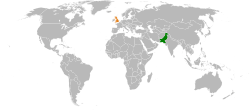Pakistan–United Kingdom relations
 |
|
Pakistan |
United Kingdom |
|---|---|
Pakistani–British relations are the relations between Pakistan and the United Kingdom. Both Pakistan and the United Kingdom are members of the Commonwealth of Nations[1] and the United Nations.[2]
History
Pakistan gained independence from the British Raj in 1947. Queen Elizabeth II served as the Queen of Pakistan as Pakistan formalised its new constitution. Pakistan's founder Muhammad Ali Jinnah and the Muslim League supported the British war effort against Nazi Germany, while Gandhi and Congress opted to boycott the war effort. Pakistan is a member of the Commonwealth of Nations.
During British rule
Much of the ruling elite of Northern India consisted of Muslim aristocrats such as Nawabs, Pirs and Sardars (tribal leaders), most of whom established friendly relations with the British Raj as the Mughal Empire declined.
Military relations
Both nations were part of Cold War alliance called the Central Treaty Organization. Pakistan's intelligence agency the ISI was formed by British officers in their departure from India, the ISI maintains extensive links with UK intelligence services and operations inside the UK.[3] The British government regards the Baluchistan Liberation Army as a terrorist organisation, it was proscribed in July 2006.[4]
Position on Kashmir dispute
The UK Foreign secretary Boris Johnson has stated "the longstanding position of the UK" as supporting for India and Pakistan to find "a lasting solution to the situation in Kashmir taking into account the wishes of the Kashmiri people." [5]
Economic relations
Pakistan and UK foreign secretaries Boris Johnson and Sartaj Aziz, pledge to expand Pakistan-UK trade relations. Foreign Secretary Johnson states that "Consider the size of the Pakistan economy, how fast it's growing, look at the size of the UK economy, we could do so much better." Pakistan is generally open to international trade, having free trade deals with Malaysia, Bangladesh and China, it is in the process of negotiating a Pakistan-Turkey Free Trade Agreement.[6]
Cultural relations
There is a 1.1 million strong British Pakistani community, the majority of whom trace their links to Pakistan-administered Kashmir, remittances have supported the local economy in developing towns such as Mirpur, Azad Kashmir and strong relations exist as a result between British Pakistanis and their Kashmiri counterparts in Pakistan.
Pakistan uses English as the language of government officials, diplomats and commerce. Approximately half of Pakistan's population speak either intermediate or advanced English, totalling 100 million people, making it one of the largest English speaking countries in the world.[7]
Pakistan plays cricket, the traditional game in England. Pakistan-England matches in the UK see a higher than usual turnout of away supporters, namely British Pakistanis, and defeated Graham Gooch's England in the 1992 World cup final. Polo is the most commonly played sport in Pakistan-administered Kashmir.
Pakistani cricketer-turned-politician Imran Khan is a renowned personal friend of Prince Charles and the British royal family. Khan's ex-wife Jemima Goldsmith was a close friend of Diana, Princess of Wales, who visited Pakistan when Imran Khan inaugurated his cancer hospital.
See also
- Anglosphere
- Foreign relations of the United Kingdom
- Foreign relations of Pakistan
- British Pakistanis
- Inter-Services Intelligence activities in the United Kingdom
References
- ↑ "Member countries Commonwealth". The Commonwealth. Retrieved 2016-11-24.
- ↑ "Member States of the United Nations". United Nations. Retrieved 2016-11-24.
- ↑ Gardham, Duncan (12 August 2011). "'Pakistani spies' in the Houses of Parliament". Telegraph. Retrieved 2016-11-24.
- ↑ "Proscribed terrorist organisations" (PDF). Home Office, United Kingdom. 15 July 2016. Retrieved 2016-11-24.
- ↑ "British Foreign Secy Boris Johnson arrives in capital: 'We call for an end to violence in Kashmir' - Pakistan". Dawn. 7 November 2016. Retrieved 2016-11-24.
- ↑ http://uk.reuters.com/article/uk-pakistan-britain-idUKKBN13J125
- ↑ "English Language Quantitative Indicators from Cameroon, Nigeria, Rwanda, Bangladesh and Pakistan" (PDF). EuroMonitor for British Council. December 2010. Retrieved 2016-11-24.

